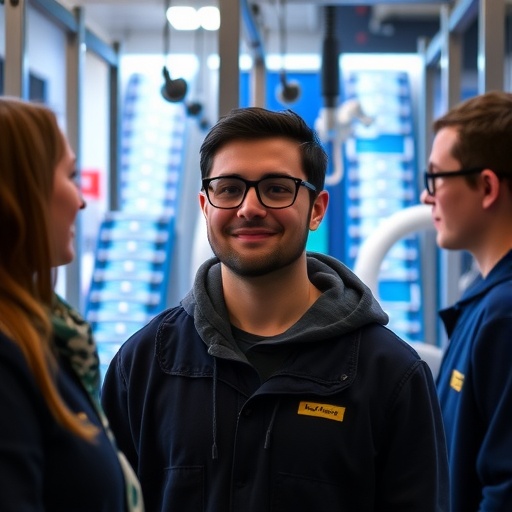In the ever-evolving landscape of biomedical engineering, educational methodologies play a pivotal role in shaping the next generation of innovators. A recent study led by S.A. Acuña, published in the journal “Biomedical Engineering Education,” introduces a groundbreaking course designed to equip graduate students with essential research skills. This innovative curriculum is a response to the increasing demand for competent researchers who can navigate the complexities of biomedical science.
The course emphasizes practical research methodologies that empower students to become not only adept engineers but also successful researchers in their fields. It stands out by integrating theoretical knowledge with hands-on experience, fostering an environment where students can apply their learning directly to real-world challenges. This dual approach is crucial in an era where the pace of technological advancement necessitates engineers who can quickly adapt and innovate.
Acuña’s research highlights the necessity for biomedical engineering programs to evolve, focusing not just on technical skills but also on developing critical thinking and research acumen. By emphasizing these skills, the course prepares students to tackle the multifaceted issues they will encounter in their careers. The pedagogical framework encourages active engagement, prompting students to question assumptions and explore novel solutions, which is vital in a field characterized by rapid developments.
One of the course’s standout features is its emphasis on collaborative learning. Students work in diverse teams, reflecting the interdisciplinary nature of biomedical research. This collaborative environment not only enhances learning but also mirrors the teamwork required in professional settings, where multiple specialties converge to address complex healthcare challenges. By cultivating these interpersonal skills, the course ensures that students are well-equipped for their future roles.
In addition to collaboration, the course integrates the latest technological tools essential for modern research. Students learn to utilize advanced software and simulation tools that are transforming the landscape of biomedical engineering. This exposure not only enhances their technical prowess but also familiarizes them with the resources they will encounter in professional settings. As the field continues to expand, proficiency in these technologies will be indispensable for future engineers.
The assessment methods employed in the course are equally innovative, moving beyond traditional examinations to include project-based evaluations. Students are tasked with developing their research proposals, conducting experiments, and presenting their findings. This hands-on assessment approach fosters deeper understanding and retention of knowledge, allowing students to demonstrate their capabilities in realistic research scenarios. The feedback provided during these assessments plays a critical role in their professional growth.
Acuña argues that this course structure addresses a significant gap in traditional biomedical engineering curricula, which often overlook the practical application of research methods. By implementing this course, institutions can cultivate a new generation of engineers who are not only knowledgeable but also skilled in translating theory into practice. This emphasis on applied learning is crucial in ensuring that graduates are ready to face the challenges of the biomedical industry.
Equally important is the focus on ethical considerations in biomedical engineering research. The course incorporates discussions on the ethical implications of research decisions, preparing students to approach their work with a sense of responsibility. As engineers often find themselves at the intersection of technology and healthcare, understanding the ethical landscape is imperative. This curriculum feature ensures that students are not only effective researchers but also conscientious practitioners.
Moreover, the role of mentorship within the course framework cannot be understated. By fostering relationships between students and experienced researchers, the program provides invaluable guidance and support. Mentorship enhances academic development and encourages professional networking, a vital aspect of success in biomedical engineering. Students gain insights from their mentors’ experiences, equipping them with knowledge that transcends the classroom.
The practical research methods course developed by Acuña demonstrates the potential to transform biomedical engineering education. By centering on active learning experiences and encouraging innovation, the program prepares students for the realities of research in their field. The benefits of such a comprehensive educational approach are manifold, contributing to the students’ confidence and competence as they transition into their careers.
The implications of this course extend beyond individual student development; they resonate throughout the biomedical engineering landscape. As graduates emerge from programs that prioritize practical research skills, they bring transformative ideas and technologies to the industry. This course serves as a model for other institutions aiming to enhance their engineering programs and better prepare students for the challenges that lie ahead.
In conclusion, Acuña’s work in developing a practical research methods course represents a significant stride towards modernizing biomedical engineering education. By emphasizing practical skills, collaboration, ethical considerations, and mentorship, this curriculum not only builds competent engineers but also instills a sense of responsibility in the next generation of researchers. As the field continues to evolve, courses like these will be essential in shaping the landscape of biomedical engineering, ensuring that future professionals are well-prepared to contribute to advancements in healthcare and technology.
The ongoing pursuit of innovative educational methods will be critical in maintaining the relevance of biomedical engineering programs. Acuña’s course exemplifies a forward-thinking approach, setting a new standard for how graduate students in biomedical engineering can achieve success. As this curriculum begins to impact the academic landscape, the hope is that it will inspire further advancements in the education of engineers, ultimately benefiting the field, the patients, and the broader community.
Subject of Research: Practical Research Methods Course for Biomedical Engineering Graduate Students
Article Title: A Practical Research Methods Course That Teaches How to Be a Successful Biomedical Engineering Graduate Student
Article References:
Acuña, S.A. A Practical Research Methods Course That Teaches How to Be a Successful Biomedical Engineering Graduate Student.
Biomed Eng Education 4, 295–304 (2024). https://doi.org/10.1007/s43683-024-00135-9
Image Credits: AI Generated
DOI: https://doi.org/10.1007/s43683-024-00135-9
Keywords: Biomedical engineering education, research methods, practical applications, ethical considerations, mentorship, collaborative learning.




